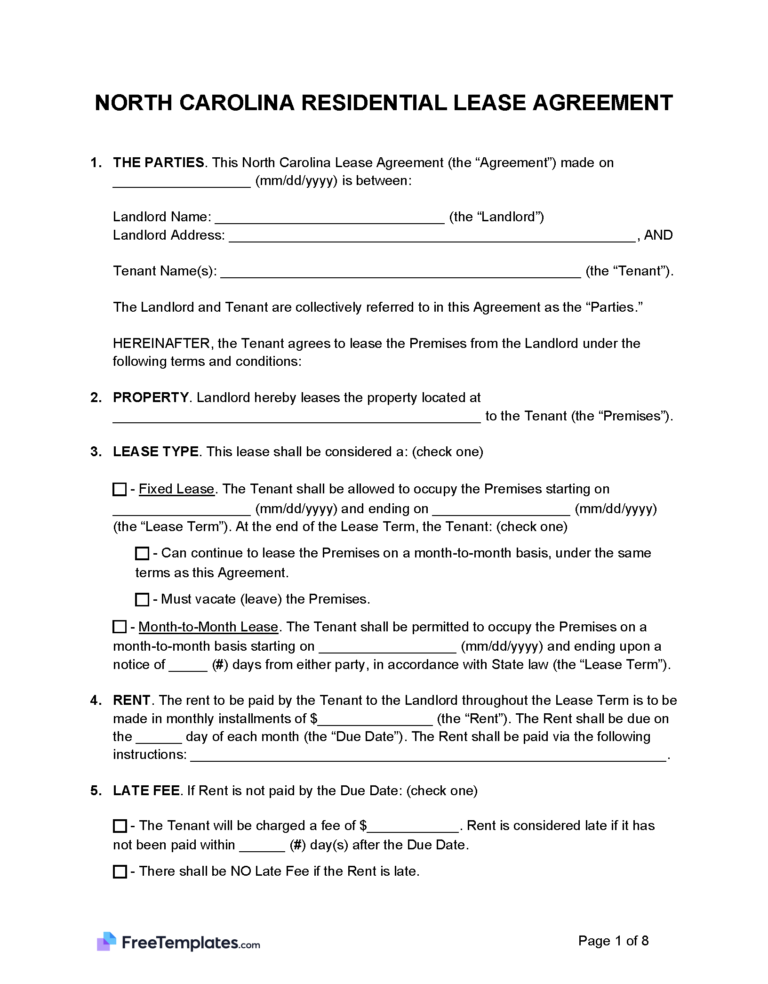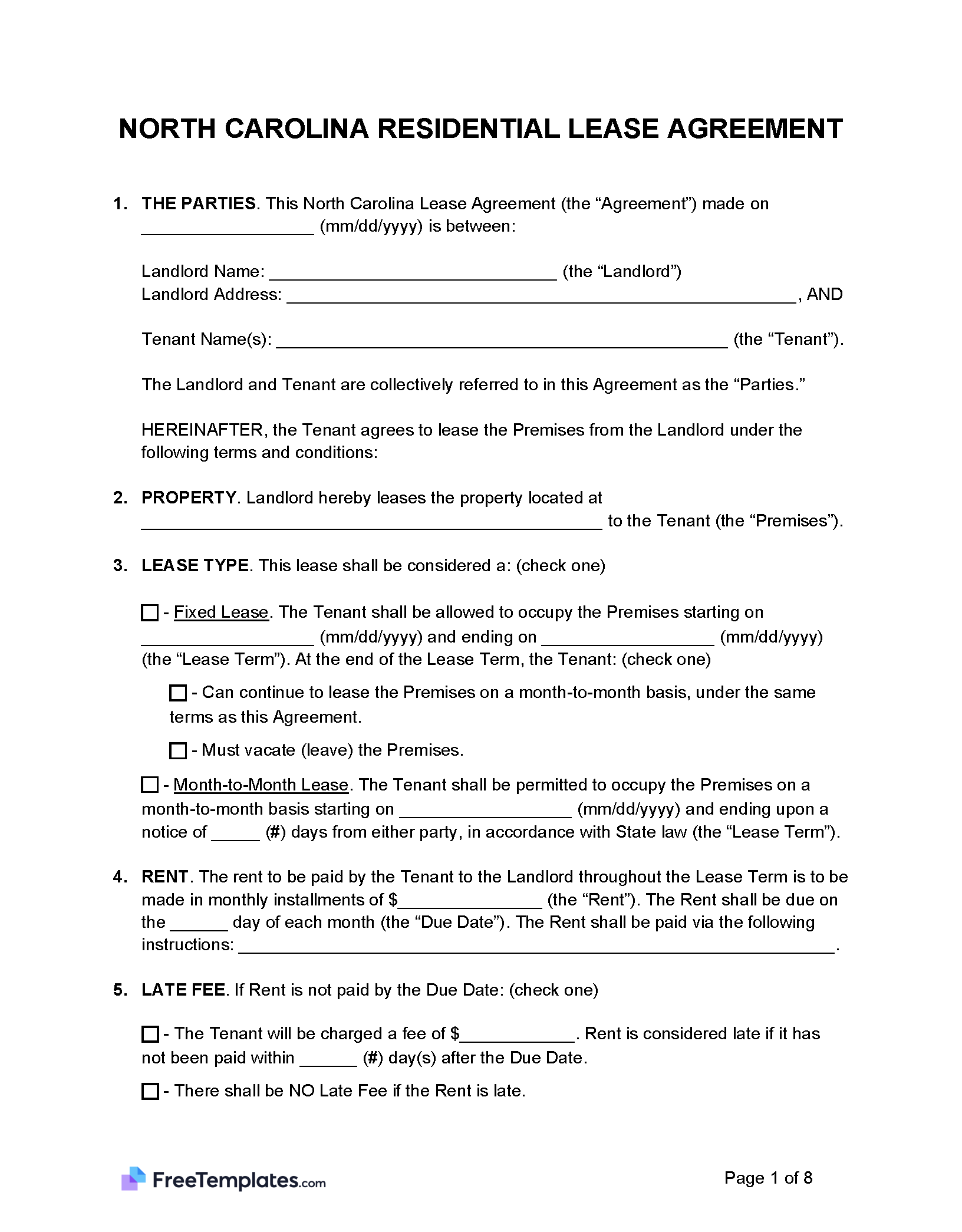By Type (6)
 Standard Lease Agreement – A typical lease in which a landlord rents a property to a tenant for a 12-month duration. Standard Lease Agreement – A typical lease in which a landlord rents a property to a tenant for a 12-month duration.
|
 Commercial Lease Agreement – A contract between a business and landlord that lays out the duties of both parties for a property rental. Commercial Lease Agreement – A contract between a business and landlord that lays out the duties of both parties for a property rental.
|
 Month-to-Month Lease Agreement – Either party can usually end this lease with a 30-day notice; it renews after each payment. Month-to-Month Lease Agreement – Either party can usually end this lease with a 30-day notice; it renews after each payment.
|
 Rent-to-Own Agreement – This is a standard lease with the added bonus that the renter can purchase the property after the lease ends. Rent-to-Own Agreement – This is a standard lease with the added bonus that the renter can purchase the property after the lease ends.
|
 Roommate Agreement – A contract between two individuals that clarifies the duties, such as cleaning, and responsibilities of each while they live together. Roommate Agreement – A contract between two individuals that clarifies the duties, such as cleaning, and responsibilities of each while they live together.
|
 Sublease Agreement – This agreement is for when a renter re-rents the space and should be approved by the landlord. Sublease Agreement – This agreement is for when a renter re-rents the space and should be approved by the landlord.
|
Disclosures (2)
Lead-Based Paint Disclosure – For properties being rented that were built before 1978, each tenant must review and sign this disclosure to ensure they are familiar with the potential harms of toxic paint on the premises.
Security Deposit Receipt – The landlord is responsible for giving their tenant a security deposit receipt within 30 days of move-in day. The receipt must list the bank’s name and address where the funds are being held. (§ 42-50)
Security Deposit
Maximum Amount – A landlord may charge a tenant a security deposit of up to two months or, for month-to-month renters, one and one-half months of rent. (§ 42-51(b))
Returning to Tenant – A tenant must receive their security deposit within 30 days of the lease’s end date. (§ 42-52)
Interest – The landlord is not responsible for accruing interest on the security deposit in North Carolina.
Itemized List Required? – If the landlord deducts any amount of the security deposit, they must provide a list of damages done to the property. (§ 42-52)
Separate Bank Account – In North Carolina, the landlord must keep the security deposit in a federally insured bank. (§ 42-50)
Landlord Access
General Access – While a landlord in North Carolina does not need to give specific notice, they are advised to provide at least 24 hours before entering the leased property.
Emergency Access – No laws in North Carolina address emergency access for landlords to enter their property.
Paying Rent
Grace Period – North Carolina has a 5-day grace period during which a renter may not be charged a late fee. (§ 42-46(a))
Maximum Late Fee – If the rent is not paid on time, the landlord may charge $15 or 5% of the monthly payment, whichever is larger. (§ 42-46(a)(1))
Returned Checks (NSF) – In North Carolina, Writing a bad rent check may result in a maximum $35 fee from the landlord. (§ 25-3-5060)
Withholding Rent – Tenants are not permitted to withhold rent if they have an issue or concern with their rental unit. Failure to fix any problem with the property may result in legal action against the landlord. (Landlord-Tenant Law (p.4))
Reasons for Eviction (3)
Non-Payment of Rent – A 10-day notice to pay or quit may be given to any tenant by a landlord when their rent has not been paid on time. (§ 42-3)
Non-Compliance – There are no specific laws regarding renters being evicted if they do not pay rent. It is always advisable that the landlord issue a notice to pay or quit to begin the eviction process.
Tenant Maintenence – If the tenant does not keep a clean and habitable rental unit, then the landlord may issue a notice. (§ 42-43(b))
Lockouts – Without a specific court order, the landlord does not have the legal right to lock out or prevent the tenant from living in the rented unit. (§ 42-25.6)
Leaving Before the End Date – If the tenant abandons their rental, then the landlord must try to re-rent the property to mitigate the loss of rent. (Isbey v. Crews, 55 N.C. App. 47, 284 S.E.2d 534 (N.C. Ct. App. 1981))

